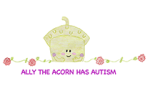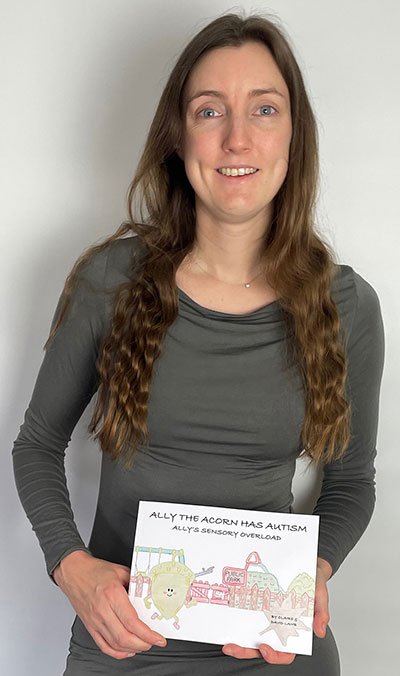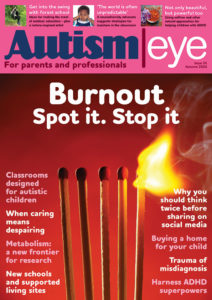Introducing Ally the Acorn has Autism: Ally’s Sensory Overload
By author Claire Lamb
I wrote this book shortly after being diagnosed with autism, as I wanted to help others with sensory difficulties.
I know from personal experience how challenging it can be to cope with sensory input and to describe to others what is upsetting me.
Especially for children on the autism spectrum
I can imagine how challenging it is for a child with autism to try and communicate their feelings about sensory difficulties; and how hard it is for their parents to understand what is upsetting them.
Therefore, I’ve written an illustrated storybook, especially for children with autism. It is based on the character I’ve created, Ally the Acorn.
Overwhelming sensory input
The story aims to show how Ally finds some everyday activities challenging, such as going to the park. Whereas most children can’t wait to jump on the slide or the roundabout, Ally becomes anxious and upset with the overwhelming sensory input, which causes her to have a sensory overload.
On Ally’s journey, she meets Adam, another acorn who has autism. Adam the Acorn has found ways to cope with sensory input and shows Ally potential solutions.
The child reader can identify themselves and their feelings in the different scenarios within the book, then use some of the techniques to help prevent a sensory overload.
Interactive questions and activities
The storybook is interactive, with questions and activities throughout – such as spotting animals or identifying colours.
The book is not just a story, as it also offers potential solutions to the challenges Ally faces.
The book, therefore, becomes a ‘tool kit’ for the family, helping everyone to understand and giving ideas and some potential solutions around sensory difficulties to help prevent sensory overload.
Where to find the book
Ally the Acorn has Autism – Ally’s Sensory Overload is available on Amazon priced from £4.99 for an ebook, or £8.75 for a paperback. See the link below:
https://www.amazon.co.uk/ALLY-ACORN-HAS-AUTISM-OVERLOAD/dp/B0CSD55FTL
Please note: I fully appreciate and respect everyone’s personal preferences when describing themselves, saying they either “have autism”, or “with autism”, or “they are autistic”. In my book, I say Ally has autism, as this is my preference. Overall, my books are intended to provide a positive connotation and support to the term ‘autism’.


















